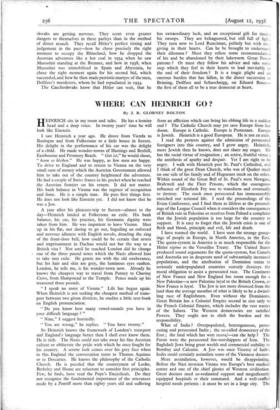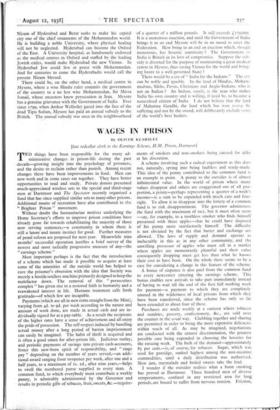WHERE CAN HEINRICH GO ?
By J. R. GLORNEY BOLTON
HEINRICH sits in my room and talks. He has a leonine head and a deep voice. In twenty years' time he will look like Einstein.
I saw Heinrich a year ago. He drove from Vial& to Boulogne and from Folkestone to a little house in Sussex. His delight in the performance of his car was the delight of a child. He made wonder-towns of Hastings and Bexhill, Eastbourne and Pevensey Beach. " Gut ist," he would shout, " kann so bleiben." He was happy, as few men are happy. To drive to England and to return to Vienna on the very small sum of money which the Austrian Government allowed him to take out of the country heightened the adventure. He had a couple of Swiss francs in his pocket when he reached the Austrian frontier on his return. It did not matter. His bank balance in Vienna was the register of recognition and fame. He is a simple man. He puts first things first. He does not look like Einstein yet. I did not know that he was a Jew.
A year after his pleasure-trip to Sussex—almost to the day—Heinrich landed at Folkestone an exile. His bank balance, his car, his practice, his Germanic dignity were taken from him. He was impatient to leave Vienna. Shut up in his flat, not daring to go out, beguiling an enforced and nervous idleness with English novels, dreading the ring of the front-door bell, how could he be certain that arrest and imprisonment in Dachau would not bar the way to a British visa ? Not until he reached London did he change • one of the three pound notes which the Nazis allowed him to take into exile. He greets me with the old exuberance, but his hair and skin are grey, the luminous eyes sunken. London, he tells me, is his wonder-town now. Already he knows the cheapest way to travel from Putney to Charing Cross, from Hampstead to the Temple. Pence made up his treasured three pounds.
" I speak no more of Vienna." Life has begun again. When Heinrich is not seeking the cheapest method of trans- port between two given districts, he studies a little text-book on English pronunciation.
" Do you know how many vowel-sounds you have in your difficult language ? "
" Nine," I suggest hurriedly.
" You are wrong," he replies. " You have twenty."
So Heinrich knows the framework of London's transport and England's language better than I shall ever know them. He is rich. The Nazis could not take away his fine Austrian culture or obliterate the pride with which he once fought for his country. A serene look comes over his grey face when in this England the conversation turns to Thomas Aquinas or to Descartes. He knows the philosophy of the Catholic Church. He is puzzled that the countrymen of Locke, Berkeley and Hume are reluctant to consider first principles. Few, he finds, have read the Pope's Encyclicals. Do they not recognise the fundamental importance of the utterances made by a Pontiff more than eighty years old and suffering from an affliction which can bring his ebbing life to a sudden end ? The Catholic Church may yet save Europe from her doom. Europe is Catholic. Europe is Protestant. Europe is Jewish. Heinrich is a good European. He is not an exile.
I read the protests against the admission of persecuted foreigners into this country, and I grow angry. Heinrich, more Jewish then he knows, does not share my anger. He has the racial virtue of resignation ; an active, fruitful virtue ; the antithesis of apathy and despair. Yet I am right to be angry. I walk with Heinrich past St. Paul's Cathedral, and I think of the great Dean Church, who was of Quaker stock on one side of his family and of Huguenot stock on the other. Within sound of the Great Bell of St. Paul's were Newgate, Bridewell and the Fleet Prisons, which the courageous influence of Elizabeth Fry was to transform and eventually to destroy. The stock once persecuted has immeasurably enriched our national life. I read the proceedings of the Evian Conference, and I find them as lifeless as the proceed- ings of the League Council when it considers the consequences of British rule in Palestine or receives from Poland a complaint that the Jewish population is too large for the country to support. It is easy to forget that the Jewish crisis is one of flesh and blood, principle and evil, life and death.
I have roamed the world. I have seen the strange group- ings of people in Europe, in North America, in the East. The quota-system in America is as much responsible for the Hitler regime as the Versailles Treaty. The United States produced sound arguments for the quota-system, but Canada and Australia are in desperate need of substantially increased populations, and the attribution of Dominion status to seriously underpopulated countries scarcely destroys the moral obligation to assist a persecuted race. The Continent of New France and New England has room enough for a New Palestine—a new Palestine loyal to the British Crown, as New France is loyal. The Jew is not more divorced from the land than the average member of what is likely to be a dwind- ling race of Englishmen. Even without the Dominions, Great Britain has a Colonial Empire second in size only to the French Colonial Empire, which includes the vast wastes of the Sahara. The Western democracies are satisfied Powers. They ought not to shirk the burden and the responsibility.
What of India ? Overpopulated, heterogeneous, perse- cuting and persecuted India ; the so-called democracy of the East ; the land which has won swaraj—can she help ? The Parsis were the persecuted fire-worshippers of Iran. The Baghdadi Jews bring great wealth and commercial stability to Bombay and Calcutta. A Jew was once Viceroy of India. India could certainly assimilate some of the Viennese doctors.
Mere assimilation, however, would be disappointing. Before the Nazi invasion Vienna was Europe's best medical centre and one of the chief glories of Western civilisation. Great doctors need co-ordinated support and magnificently equipped hospitals at their command. And a well-staffed hospital needs patients : it must be set in a large city. The Nizam of Hyderabad and Berar seeks to make his capital city one of the chief ornaments of the Mohammedan world. He is building a noble University, where physical healing will not be neglected. Hyderabad can become the Oxford of the East. A University hospital, as handsomely endowed as the medical centres in Oxford and staffed by the leading Jewish exiles, would make Hyderabad the new Vienna. In Hyderabad Jew could live at peace with Mohammedan. And for centuries to come the Hyderabadis would call the present Nizam blessed.
There could be, on the other hand, a medical centre in Mysore, where a wise Hindu ruler commits the government of the country to a no less wise Mohammedan, Sir Mirza Ismail, whose ancestors knew persecution in Iran. Mysore has a genuine grievance with the Government of India. Ever since 1799, when Arthur Wellesley gazed into the face of the dead Tipu Sultan, Mysore has paid an annual subsidy to the British. The annual subsidy was once in the neighbourhood of a quarter of a million pounds. It still exceeds L170,000. It is a monstrous exaction, and until the Government of India brings it to an end Mysore will be in no mood to enter the Federation. How bring to an end an exaction which, though monstrous, has historic continuity ? The Government of India is British in its love of compromise. Suppose the sub- sidy is diverted for the purpose of maintaining a great medical centre in Mysore, thus saving Vienna for the world and bring- ing lustre to a well-governed State ?
There would be a cry of" India for the Indians." The cry can be noble and ignoble. In the land of Hindus, Moham- medans, Sikhs, Parsis, Christians and Anglo-Indians, who is not an Indian ? An Indian, surely, is the man who makes India his own country and is willing, if need be, to become a naturalised citizen of-India. I do not believe that the land of Mahatma Gandhi, the land which has won szvaraj by suffering and not by the sword, will deliberately exclude some of the world's best healers.







































 Previous page
Previous page